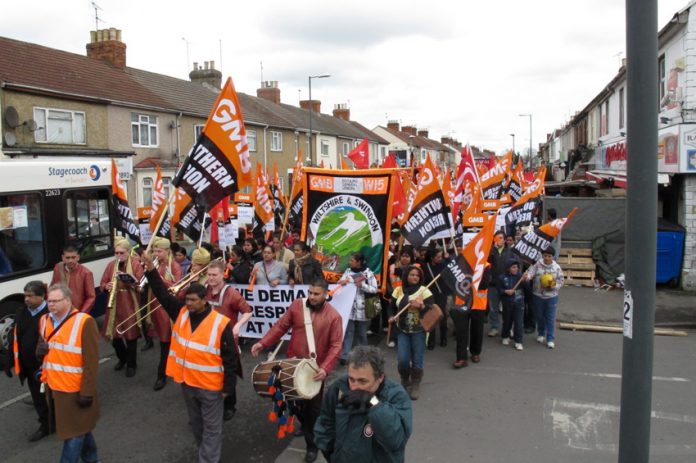HOSPITAL workers at the Great Western Hospital in Swindon, Wiltshire, are set to take further strike action against yet another round of vicious attacks on their jobs, wages and working conditions by the international privateer Carillion.
The mainly women workers have voted by a massive 98.3% in favour of industrial action against job cuts, pay cuts and the imposition of utterly obnoxious new rosters.
The GMB has now given notice to Carillion of the 98.3% vote for industrial action in an official ballot.
GMB officers and shop stewards will meet to assess the result of the ballot and fix dates for industrial action to commence in this new dispute involving GMB at the hospital.
GMB had already advised Carillion that GMB members working for the company at the hospital have unanimously rejected the proposed new shift and rota changes in a workplace ballot.
The changes will mainly affect housekeeping staff and ward hostesses though all staff will lose paid breaks.
Of the current cleaning workforce of 200, around 20 will be made redundant, but every member of staff will be doing 80 hours less cleaning each year.
GMB members stand to lose on average £650 per year, due to loss of unsocial hours payments, and some staff will lose up to 11 lieu days.
The new arrangements introduce 12-hour shifts; with a one-hour unpaid break in the middle.
There are particular problems for staff with childcare commitments, or second jobs.
The new longer shifts will also mean that staff will not be able to get to and from work by public transport on Sundays, and few of the staff own cars.
In 2012, there were 21 days of strike action by these workers in protest against bullying and discrimination by Carillion at the hospital.
GMB members demanded that Carillion management act to stop the culture of bullying on the contract and for an end to discrimination in the application of pay and conditions on the contract.
That dispute is still on-going as Carillion refused to acknowledge the continued discrimination and victimisation of employees.
This has so far resulted in fifty-seven cases filed against Carillion in the employment tribunal.
GMB are extremely confident of a just resolution through litigation.
Carole Vallelly, GMB organiser, said: ‘GMB members in Carillion are sending a strong message to management with this huge vote of over 98.3% in favour of industrial action at the Great Western Hospital.
‘Carillion is trying to force through unworkable changes to hours and shifts, which will mean our members will be losing money that they just cannot afford to lose.
‘Many of our, mainly female, members will simply not be able to work the new shifts as they have caring responsibilities, but Carillion refuse to work with us and listen to our members’ concerns.
‘GMB questions whether Carillion can maintain the same standards of cleaning at the Hospital with less staff doing less hours.
‘Our members will be expected to do the same amount of work in much less time, and with fewer of them.
‘There is a very real fear that Carillion’s cleaning cuts could cost lives.’
l In a separate dispute, GMB lawyers in June 2013 lodged claims in the High Court in London seeking compensation for 70 GMB members blacklisted by Carillion and other construction employers.
In October, Carillion was one of eight blacklisting companies (Balfour Beatty, Carillion, Costain, Kier, Laing O’Rourke, Sir Robert McAlpine, Skanska UK and VINCI PLC) that went some way towards an apology and have offered to compensate the victims they blacklisted.
This is an important step forward in the campaign on blacklisting.
However, no details have been announced and the companies have yet to meet unions or their lawyers to discuss the offer.
Blacklisting came to light when in 2009 the Information Commissioners Office (ICO) seized a Consulting Association database of 3,213 construction workers and environmental activists used by 44 companies to vet new recruits and keep out of employment trade union and health and safety activists.
Blacklisting by Carillion was not something isolated or rare.
GMB estimates that in the period from October 1999 to April 2004 Carillion checked at least 14,724 names with the Consulting Association.
Carillion involvement with the Consulting Association blacklist included Crown House, Schal International, SkyBlue Employment Agency, Tarmac and John Mowlem as well as Carillion itself.
ICO files show that 224 construction workers were victims of blacklisting by these Carillion companies.
Carillion managers named as involved in blacklisting are: Frank Duggan, group personnel director for Carillion; Kevin Gorman, former human resources manager for Carillion’s Crown House division; Liz Keates, a current head of human resources at Carillion; Sandy Palmer and Dave Aspinall from NCS (Carillion’s in-house employment agency); John Ball, head of human resources at Carillion; Roger Robinson and Brian Tock, two managing directors of Crown House.
John Edwards from Carillion attended Consulting Association meetings in 2008.
John Blake, a senior manager for Carillion, has admitted collating information that appeared on a blacklist file and sending it to John Ball.
Carillion continues to say that they ‘proactively stopped’ blacklisting in 2004.
GMB has asked, without a response, when and how Carillion removed the 137 names of construction workers that Sir Robert McAlpine says Carillion supplied to the blacklist which was in operation until 2009 when it was shut down.
